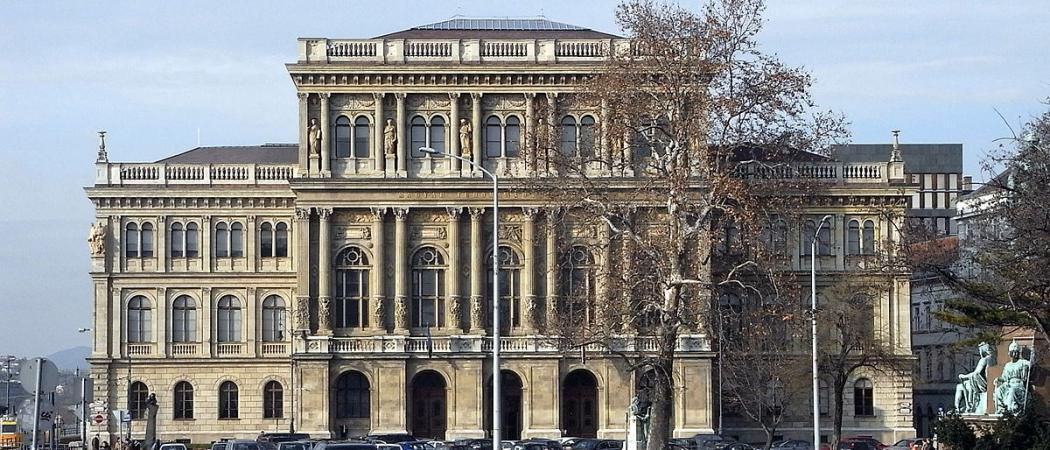European academies say government’s proposed reorganisation at the academy will ‘politicise scientific research’

Budapest headquarters of the Hungarian Academy of Sciences
European academies are calling on the Hungarian government to stop “recurring and unfounded interventions” in the structure and funding of the research institutes of Hungary’s academy of sciences.
The European Federation of Academies of Sciences and Humanities (ALLEA) says the proposed reorganisation of the structure and funding of academy’s research institutes harm academic freedom, scientific excellence and the self-governance of scientific institutions. By withholding funding for basic maintenance costs and salaries, the government “politicises scientific research and jeopardises Hungary’s strong European and international partnerships in science,” the federation said.
“The refusal to guarantee basic funding required by law is unacceptable,” said Antonio Loprieno, president of ALLEA.
European academics say the changes have nothing to with science, but more with the government trying to assert its ideology in the academy’s research institutes. “One can understand the situation of the Hungarian Academy of Sciences only in a political context,” Jerzy Duszyński, president of the Polish Academy of Sciences told Science|Business.
“It’s obvious for me that the conflict is not scientific,” Duszyński said, arguing that the government is putting the academy on the ropes because it sided with the Budapest-based Central European University (CEU) in a row over its ability to continue offering US-accredited courses in Hungary. “It seems a repercussion for the academy’s support to CEU,” said Duszyński.
An amendment introduced by Hungarian minister for innovation and technology László Palkovics to the 2019 budget sliced 40 per cent off the academy’s budget and put it under the government’s direct control. The justification is that the country needs to direct more funding to applied sciences at the expense of the humanities, to boost Hungary’s innovation output.
Negotiations ahead
The academy is due to enter a round of high-level negotiations with the government, with its president Laszlo Lovász hoping to broker a deal that will safeguard the budget and the academic freedom of the academy’s research institutes.
Last week, the academy’s board agreed to allow research institutes to apply for funding from an “excellence programme” to cover basic costs such as salaries and maintenance, provided that the government restores the academy’s full 2019 budget.
However, academy researchers do not see a positive end to the negotiations. “I'm afraid these actions are mere formalities now, as the government looks quite relentless, accomplishing whatever destructive plan they have in mind,” said Róza Vajda, junior research fellow at the department for Methodology and History of Research in the academy.
Hungarian researchers are also worried that, whatever the outcome of negotiations, the government will carry on with plans for the reorganisation of the academy. “At best, we can gain maybe a few more months’ salaries, and ensure a smoother transition towards the lack of independent research,” Vajda said.
Academics from outside Hungary warn that the government is using ideology to hurt an established network of research institutes. “The most advanced scientific institution of Hungary suffers [for] ideological reasons,” Duszyński said.
Last week, researchers took to the streets of Budapest to show their support for the academy but acknowledge that the fight might be fruitless. “It does matter if we can demonstrate some opposition,” said Vajda. “At the same time, the deeper we enter into the darkness of the new regime, the more destruction and self-destruction we have to suffer.”
Collateral damage
Other institutions in Hungary have also been hit by the conflict between the academy and the government.
After a change to the Hungarian higher education law forced it to move a majority of its course to Vienna, CEU has recently suspended admissions at its department of mathematics, a joint programme taught in partnership with researchers from the academy’s Alfred Renyi Institute of Mathematics. The institute “will no longer be in a position to act as our teaching partner,” said rector Michael Ignatieff in an email to university staff and students.
It is unclear whether admissions were suspended because of recent pressures on the academy or because the university simply did not find a way to bring researchers at the Renyi institute to teach in Vienna. A CEU spokeswoman told Science|Business the university does not want to comment further on the issue.
In a separate statement, CEU said it sees “both the freedom of research and the professional careers of our [academy] colleagues as being put at risk.”





 A unique international forum for public research organisations and companies to connect their external engagement with strategic interests around their R&D system.
A unique international forum for public research organisations and companies to connect their external engagement with strategic interests around their R&D system.